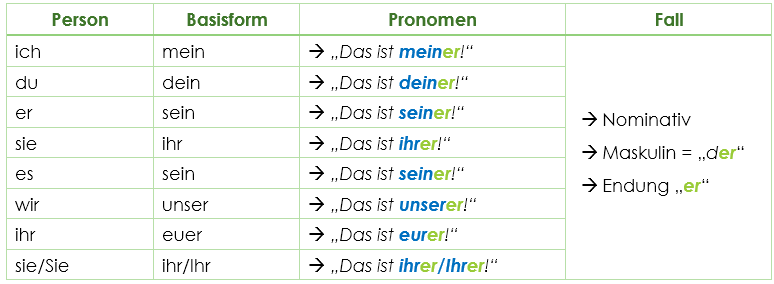What are Possessive Pronouns? (Possessivpronomen)
Possessive Pronouns show ownership or belonging and replace a previously mentioned noun. They are mein, dein, sein, ihr, unser, euer, ihr and the declined forms.
Example:
- „Ist das dein Koffer?“ – „Ja, das ist meiner!“
- „Wem gehört die Katze?“ – „Das ist meine!“
Possessive Articles and Possessive Pronouns
Difference between Possessive Article and Possessive Pronouns
- „Wem gehört der Ball?“ – „Das ist mein Ball.“
⇒ Possessive Article, because there is a noun behind it.
- „Wem gehört der Ball?“ – „Das ist meiner.“
⇒ Possessive Pronouns, because there is no noun behind it.
Pronouns replace nouns. This means that with a noun behind it, it is a Possessive Article (i.e., a companion) and only standing alone, i.e., without a noun, it is a Possessive Pronoun. The difference is important because the declension is different in the Nominative and Accusative case.
Construction
- The "owner" (ich, du, er, sie, es, wir, ihr, sie, Sie) determines the base form.
- The Gender and Number of the noun that is "owned", as well as the Case, tell you which ending you have to use.
= 100% Just like the Possessive Articles
„Wem gehört der Ball?“ (Gender = masculine)

Declension
The Declension is related to the Possessive Article's declension.
But: Pronoun always take the ending of the Definite Article, including in the Nominative Case (m/n) and Accusative Case (m).

By looking at the endings, you can see that the endings exactly match those of the Definite Articles.
Are you still having problems with the German cases?
If the German cases still cause you great difficulties, I now have the solution for you!
After you read my book/ebook: „Nominative, Accusative, Dative or Genitive? - No Problem!“ you'll even be able to explain the cases to your friends! Guaranteed - or you'll get your money back!

Use of Possessivpronomen
Possessivpronomen (Possessive Pronouns) are used as a substitute for a previously mentioned noun when asking about affiliation.
- „Wem gehört das Auto?“ - „Das ist mein(e)s!“
We use it mostly after the question of who owns something. If you repeat the noun, it is no longer a Possessive Pronoun anymore but a Possessive Article.
Gramato: Your German Grammar Coach
Try Gramato now!
Powered by EasyDeutsch AI

This is how Gramato can help you!
Gramato helps you with all your German grammar questions – fast, to the point, and always based on the trusted content from https://easy-deutsch.com.
Gramato offers fill-in-the-blank exercises on a variety of grammar topics, tailored to your level so you can practice exactly what you need.
Get answers in multiple languages – German, English, Spanish, French, and more. That way, you can understand grammar in the language you feel most comfortable with.
Clear and simple grammar explanations – so you can learn faster and smarter with Gramato.
Ask your questions or practice anytime with Gramato – no wait, just results!
Related Topics:
Entire lesson in German only: Possessivpronomen
You must not confuse Possessive Pronouns with the Possessivartikel (Possessive Articles).
More lessons on Pronouns:
- Was sind Pronomen? (What are Pronouns?)
- Personalpronomen (Personal Pronoun)
- Reflexivpronomen (Reflexive Pronoun)
- Demonstrativpronomen (Demonstrative Pronoun)
- Relativpronomen (Relative Pronoun)
- Indefinitpronomen (Indefinite Pronoun)
- Pronomen „es" (Pronoun "es")
Pronouns have to be declined. Therefore, you must also be familiar with the declension and the deutschen Fällen (German Cases):
You can find an overview of all topics under German Grammar.
Recommendation: Free video lessons every Tuesday & Thursday
Sign up now: Email German Grammar course


